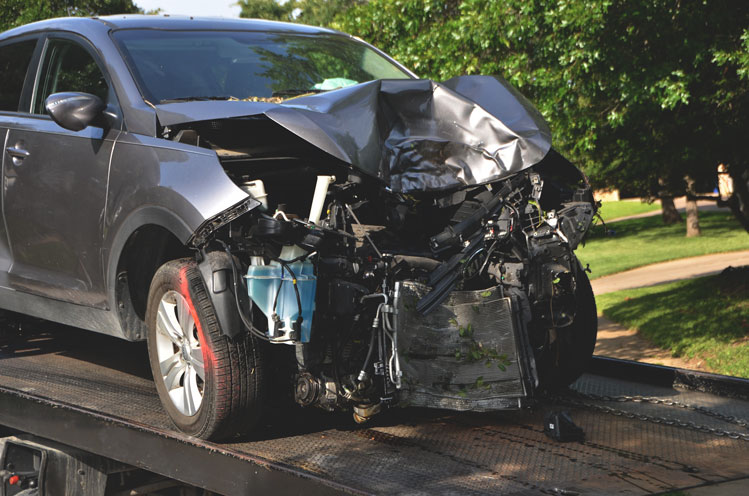What If I Wasn’t Wearing a Helmet When I Got Into a Motorcycle Accident?
Compared to the cars and semi trucks they share the road with, motorcycles are small vehicles that expose their riders to more risk than the average driver of a passenger car. Because of this, motorcycle accidents often result in more serious injuries to the rider than to the driver of the car that hit them. […]

September 25, 2017

Compared to the cars and semi trucks they share the road with, motorcycles are small vehicles that expose their riders to more risk than the average driver of a passenger car. Because of this, motorcycle accidents often result in more serious injuries to the rider than to the driver of the car that hit them.
But another reason motorcycle accidents can be much more severe is if the motorcyclist chooses not to wear a helmet. As the medical bills pile up, the victim of a motorcycle accident may wonder if their decision not to wear a helmet will prevent them from seeking compensation.
There are two things we’ll need to look at to determine how not wearing a helmet may affect someone’s claim: what Indiana law says about wearing a motorcycle helmet, and what Indiana law says about how fault affects a motorcycle accident.
Indiana’s Motorcycle Laws

In Indiana, it is perfectly legal to choose not to wear a helmet when operating a motorcycle as long as the motorcyclist is 18 or older. Motorcyclists under the age of 18 are required to wear helmets and eye protection.
What It Means to Be a Fault State

Indiana is a fault state, which means that the person who is found to be at fault in the accident is responsible for covering your damages.
Fault in Indiana can be divided by percentage. This is what’s known as comparative fault. For example, if the person was texting while driving when they hit you, they’re likely to be found at fault for the accident. But if you were going 10 miles over the speed limit, you may be found partially at fault. If you’re found to be less than 51 percent at fault for the accident, you’ll be able to pursue the other driver’s insurance company to recover your damages.
Typically, the percentage you are at fault affects how the percentage of your damages you can expect to recover from the other driver’s insurance company. For example, if you’re found to be 20 percent at fault, you’ll likely only be able to recover 80 percent of your damages from the other driver’s insurance company.
What Does This Mean For Your Claim?

To be found at fault, your negligence has to contribute directly to the cause of the accident.
For most motorcycle claims, this means that even if you weren’t wearing a helmet, that shouldn’t contribute to the percentage you’re found to be at fault for the accident. You’re perfectly within your rights not to wear a helmet, and even if you’re under eighteen and weren’t wearing a helmet, your lack of helmet didn’t contribute to the cause of the accident.
The insurance company will try to say that your lack of a helmet contributed to your injuries, so you don’t deserve as large of a settlement to cover your damages associated with the motorcycle accident. Sometimes, even juries fall for this line of thinking. However, an experienced motorcycle accident attorney can show that your lack of helmet shouldn’t be a factor in determining your damages because it doesn’t contribute to your percentage of fault.
This same argument is used in car accident cases where the driver or passengers weren’t wearing seat belts. Although it’s against the law in Indiana not to wear a seat belt, your lack of seat belt likely didn’t contribute to the cause of the accident, so it shouldn’t contribute to your percentage of fault.
There are exceptions, of course. Sometimes, your lack of helmet or lack of seat belt may in fact contribute to the cause of the accident. If you remove your helmet while riding and get into an accident, or if you attempt to put on or take off your seat belt while driving and get into an accident, you may find it hard to argue that those actions didn’t contribute to your accident.
It is important to note that some insurance policies can legally have clauses that say that if you’re not wearing a helmet on a motorcycle or wearing a seat belt in a vehicle, your ability to recover may be diminished. Check your insurance policy before you ride a motorcycle without a helmet to make sure you’re not reducing your ability to recover in case of an accident.
Help from an Indiana Motorcycle Accident Attorney
Even if you’re legally allowed to not wear a helmet while riding a motorcycle, you still may find it difficult to recover after a motorcycle accident, even if the accident wasn’t your fault. Hensley Legal Group can help. Call us today or contact us online for a free consultation.
Available 24/7
Free Case Review
You won’t pay any fees until we win your case.
It’s easy - you can: